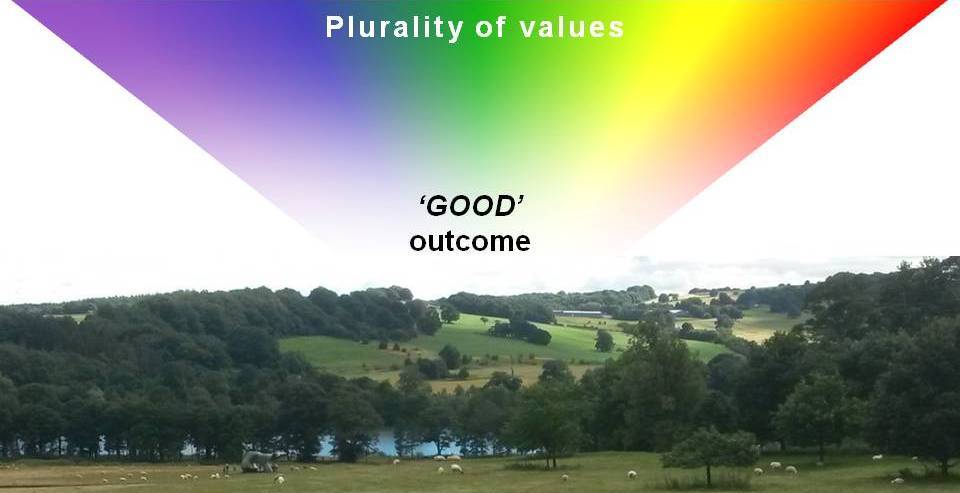
The FiSWES project began in 2015 by taking a critical look at the ecosystem services framework for nature conservation, and the ideas developed by that small Christian working group are now bearing fruit in a new context. I began a fellowship last year with a group called the Centre for the Evaluation of Complexity Across the Nexus (CECAN), where I’ve been developing the ecosystem valuing framework for use in policy evaluation. My fellowship is about “putting values into evaluation”, and I want to tell you how it’s going.
CECAN’s unwieldy name means “we develop ways to evaluate policies for complex problems”. The idea behind this cross-university project is that many government policies address complex situations at the “nexus” of challenges to provide water, energy and food security. Evaluating the success, or likely success, of such policies is difficult because the challenges are so diverse and interconnected, each having a global context. Simple evaluation methods that assess a policy’s success against different criteria independently will tend to overlook the significance of side-effects and trade-offs, when what is needed is “win-win” approaches that simultaneously improve different aspects of the same situation.
Last week I had the privilege of leading a workshop in London with a group of civil servants in environmental policy appraisal. Here, along with my colleagues Ian Christie and Adam Hejnowicz, I presented what we’re calling a pluralistic evaluation framework. The basic idea of this is that “goodness” can be refracted into many kinds of value that should be considered during the design and evaluation of any policy. We’re talking here about values assigned to things and situations (beauty, efficiency, etc), rather than people’s value-orientations (integrity, honour, etc.). A “good” policy might mean one that is likely to foster innovation, beautify landscapes, grow the rural economy, enhance social justice, or increase levels of volunteering: it could be “good” in many different ways. So if a policy pledges – as does the Government’s 25-Year Environment Plan – “to leave the environment in a better state than we found it”, we might ask: what does “better” mean?
Classic consequentialist ethics would try to use a simple metric of goodness to decide which of a number of courses of action should have the best consequences. If “good” refers to the sum total of human happiness, for example, then although this might be difficult to measure, in principle it provides such a metric. Some scientist might even propose a scientific definition of happiness, allowing the decision to be made on purely objective grounds! (This scientist would be captive to an implausible notion of objectivity, but that’s another topic.) But sooner or later someone might point out some ways of increasing the sum total of human happiness that are in other respects deplorable – or that not all humans consider happiness to be their own ultimate good – and the problems of this naive consequentialism would become evident.
A Christian approach should be important here, and I hope that the pluralistic evaluation framework is more consistent with a biblical worldview. This is because it provides a tool for considering a very wide range of kinds of goodness – wider, indeed, than people normally think of. The map of meaning proposed by Herman Dooyeweerd and developed in the tradition of Reformational philosophy outlines a sequence of aspects in which all of reality is meaningful, in each of which we might recognise better and worse ways of functioning. This is the basis of the framework I presented last week, and will be presenting again in York in a few weeks’ time. The bottom line of this framework is that wise judgment is ultimately needed for assessing the overall goodness of a policy, or any other situation. The classic art of good governance will surely never be superseded by any scientific tool or technique.
Wisdom is of course an important biblical theme as regards governance. Graeme Goldsworthy* points out that King Solomon’s wisdom is portrayed in the Hebrew Scriptures as a kind that was consonant with the Law of Moses yet beautifully integrative: Solomon knew how to act decisively for good in his kingdom. Centuries later Jesus, “one greater than Solomon”, urged his disciples to “seek first the Kingdom of God”, evoking the prophetic vision of a reign of shalom where every kind of goodness would prevail. Now that would be a worthy vision for policymaking!
* Goldsworthy, G (1995) Gospel and Wisdom: Israel’s Wisdom Literature in the Christian Life
- Imaging our Creator; imaging ourselves? - February 4, 2026
- Wise Men Still Seek Him - January 6, 2026
- Philosophy in full colour - October 21, 2025


